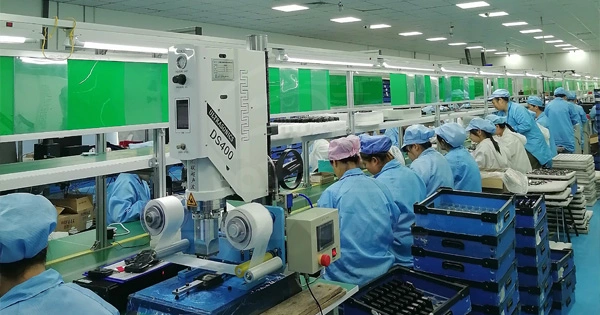Introduction
In today’s electronics-driven world, the role of a PCBA Manufacturer is pivotal. From smart home devices to life-saving medical equipment, every innovation relies on precise, reliable assembly of components onto PCBs. At SprintPCB, our PCBA manufacturing services blend cutting-edge automation, ISO-certified workflows, and end-to-end support to deliver boards that power industries globally. This guide explores how to choose the right PCBA partner and optimize production.
What Is a PCBA Manufacturer? Beyond Soldering Components
A PCBA Manufacturer specializes in transforming bare PCBs into functional electronic assemblies through:
- Key Processes: SMT (Surface Mount Technology), through-hole assembly, conformal coating, testing.
- Capability Spectrum: Prototyping (1–100 units) to high-volume production (50,000+ units/month).
- Industry Applications:
- Consumer Electronics: Wearables, smart speakers.
- Automotive: ADAS control modules, EV battery management.
- Industrial IoT: Sensor nodes, robotics controllers.
Why Expertise Matters:
- A skilled PCBA Manufacturerensures <1% defect rates via advanced AOI (Automated Optical Inspection).
- Compliance with standards like IPC-A-610 (Class 3 for aerospace/medical).
5 Reasons to Partner with a Certified PCBA Manufacturer
- End-to-End Solutions: From PCB fabrication to final box-build assembly.
- Advanced Equipment: High-speed SMT lines (50,000 CPH) and 3D SPI (Solder Paste Inspection).
- Supply Chain Management: Component sourcing with real-time inventory tracking.
- Testing Rigor: In-circuit testing (ICT), functional testing (FCT), and burn-in testing.
- Regulatory Compliance: RoHS, REACH, and ISO 13485 (medical devices).

Inside SprintPCB’s PCBA Manufacturing Process
Step 1: Design Review & DFM Analysis
- Validate BOM (Bill of Materials) for obsolete or counterfeit components.
- Optimize component placement for automated assembly.
Step 2: Solder Paste Application
- Stencil printing with 25μm accuracy for 01005 (0.4mm) components.
- SPI systems check paste volume (±10% tolerance).
Step 3: Component Placement
- High-speed SMT machines place 0402 resistors, QFN packages, and BGAs.
- Vision systems ensure ±0.025mm placement precision.
Step 4: Reflow Soldering
- 10-zone reflow ovens with nitrogen atmosphere to prevent oxidation.
- Thermal profiles tailored for lead-free (SAC305) or low-temperature alloys.
Step 5: Through-Hole Assembly
- Selective soldering for mixed SMT/THT boards.
- Hand soldering for delicate connectors or legacy components.
Step 6: Conformal Coating & Testing
- Acrylic, silicone, or urethane coatings for moisture/chemical resistance.
- 100% functional testing under simulated operating conditions.
How to Choose a PCBA Manufacturer: 6 Critical Criteria
- Technical Capability:
- Can they handle 0.3mm pitch BGAs or 20-layer HDI boards?
- Certifications:
- ISO 9001, IATF 16949 (automotive), AS9100 (aerospace).
- Turnaround Time:
- Prototype lead time: 3–5 days vs. 10+ days for competitors.
- Scalability:
- Seamless transition from 10 to 10,000 units without quality loss.
- Component Sourcing:
- Partnerships with authorized distributors (e.g., Arrow, Avnet).
- Transparency:
- Live production tracking and detailed test reports.
Cost Drivers in PCBA Manufacturing: How SprintPCB Optimizes ROI
| Factor | Cost Impact | SprintPCB’s Solution |
| Component Prices | Shortages can spike costs 50–200% | Long-term contracts with suppliers. |
| Labor | Manual assembly raises costs | 85% automation rate reduces labor by 70%. |
| Testing | Full ICT/FCT adds 15–20% cost | Risk-based testing (e.g., sample testing for stable designs). |
| Geolocation | Offshore factories save 20–30% | Dual-shore production (US & Asia). |
Industry-Specific PCBA Solutions: Meeting Unique Demands
Medical Devices:
- Cleanroom assembly (Class 8) and biocompatible coatings.
- Traceability per FDA 21 CFR Part 11.
Automotive:
- AEC-Q200 qualified components and 3D X-ray inspection.
- IATF 16949-certified processes.
Aerospace:
- Extended temperature range (-55°C to 150°C) assemblies.
- Conformal coating per MIL-I-46058C.
The Future of PCBA Manufacturing: 2024 Trends
- AI-Driven Defect Detection: Machine learning reduces false positives in AOI by 40%.
- Digital Twins: Simulate assembly processes to prevent errors pre-production.
- Sustainable Practices:
- Recyclable solder alloys and halogen-free PCBs.
- Carbon-neutral factories powered by renewables.
- Miniaturization:
- 0201 components and ultra-fine pitch (0.2mm) BGAs.
Why SprintPCB Stands Out as Your PCBA Manufacturer
- Speed: 48-hour prototype turnaround with 24/7 engineering support.
- Quality: <500 DPPM (Defects Per Million) across all orders.
- Global Reach: Warehouses in the US, EU, and Asia for just-in-time delivery.
- Customization: Support for rigid-flex assemblies, LED PCBA, and RF testing.
Conclusion
Selecting the right PCBA Manufacturer can make or break your product’s success. With SprintPCB, you gain a partner committed to precision, innovation, and transparency—whether you’re launching a startup’s first prototype or scaling a Fortune 500 supply chain.
Ready to streamline your PCBA production? Request a free quote today and join 5,000+ brands trusting SprintPCB!

